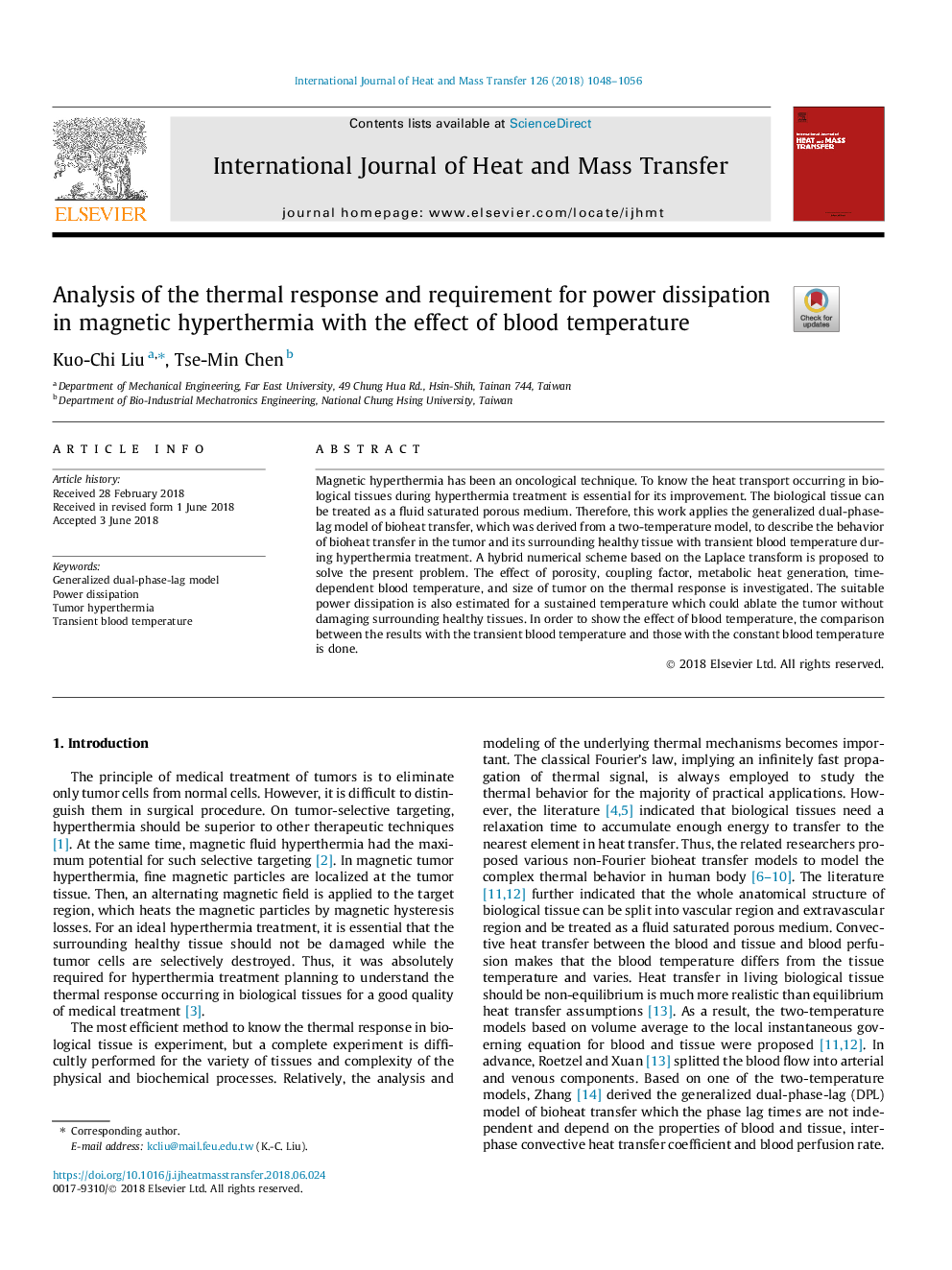| کد مقاله | کد نشریه | سال انتشار | مقاله انگلیسی | نسخه تمام متن |
|---|---|---|---|---|
| 7053931 | 1458013 | 2018 | 9 صفحه PDF | دانلود رایگان |
عنوان انگلیسی مقاله ISI
Analysis of the thermal response and requirement for power dissipation in magnetic hyperthermia with the effect of blood temperature
ترجمه فارسی عنوان
تجزیه و تحلیل واکنش حرارتی و نیاز به انحلال قدرت در هیپرترمی مغناطیسی با اثر درجه حرارت خون
دانلود مقاله + سفارش ترجمه
دانلود مقاله ISI انگلیسی
رایگان برای ایرانیان
کلمات کلیدی
مدل سازی دوگانه فازی عمومی، اتلاف قدرت، هیپرترمی تومور، دمای خون گذرا،
ترجمه چکیده
هیپرترمی مغناطیسی تکنیک انکولوژیک بوده است. شناختن انتقال حرارت در بافت های بیولوژیک در طی درمان هیپرترمی برای بهبود آن ضروری است. بافت بیولوژیکی می تواند به عنوان یک محیط متخلخل مایع اشباع شده باشد. بنابراین، این کار، مدل تعبیه شده دو فازی انتقال بیوگرافی را که از مدل دو دمایی بدست آمده است، برای توصیف رفتار انتقال بیوگش در تومور و بافت سالم اطراف آن با درجه حرارت گذرا در حین درمان هیپرتمایی مورد استفاده قرار می دهد. یک طرح عددی ترکیبی بر مبنای تبدیل لاپلاس پیشنهاد شده است تا مشکل موجود را حل کند. اثر تخلخل، عامل اتصال، تولید گرما متابولیکی، درجه حرارت خون وابسته به زمان و اندازه تومور بر پاسخ حرارتی مورد بررسی قرار گرفته است. از دست دادن قدرت مناسب نیز برای یک دمای پایدار که می تواند تومور را بدون آسیب رساندن به بافت های اطراف سالم تخلیه کند تخمین زده می شود. به منظور نشان دادن اثر دمای خون، مقایسه نتایج با درجه حرارت گذرا و همچنین دمای ثابت دما انجام می شود.
موضوعات مرتبط
مهندسی و علوم پایه
مهندسی شیمی
جریان سیال و فرایندهای انتقال
چکیده انگلیسی
Magnetic hyperthermia has been an oncological technique. To know the heat transport occurring in biological tissues during hyperthermia treatment is essential for its improvement. The biological tissue can be treated as a fluid saturated porous medium. Therefore, this work applies the generalized dual-phase-lag model of bioheat transfer, which was derived from a two-temperature model, to describe the behavior of bioheat transfer in the tumor and its surrounding healthy tissue with transient blood temperature during hyperthermia treatment. A hybrid numerical scheme based on the Laplace transform is proposed to solve the present problem. The effect of porosity, coupling factor, metabolic heat generation, time-dependent blood temperature, and size of tumor on the thermal response is investigated. The suitable power dissipation is also estimated for a sustained temperature which could ablate the tumor without damaging surrounding healthy tissues. In order to show the effect of blood temperature, the comparison between the results with the transient blood temperature and those with the constant blood temperature is done.
ناشر
Database: Elsevier - ScienceDirect (ساینس دایرکت)
Journal: International Journal of Heat and Mass Transfer - Volume 126, Part B, November 2018, Pages 1048-1056
Journal: International Journal of Heat and Mass Transfer - Volume 126, Part B, November 2018, Pages 1048-1056
نویسندگان
Kuo-Chi Liu, Tse-Min Chen,
